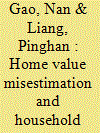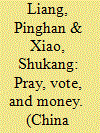| Srl | Item |
| 1 |
ID:
168350


|
|
|
|
|
| Summary/Abstract |
Households often make errors when self-assessing their housing wealth. By using the Chinese Households Finance Survey, we show that Chinese urban households systematically overestimate their home value. This bias is significantly related to household consumption: a one standard deviation increase in the extent of estimation bias is associated with a 10% increase in household consumption. Our main results are robust against a variety of robustness checks, e.g., taking into account the expectations of future home price, using the interviewee's estimation as the instrumental variable for the household self-estimation, implementing the hedonic model on an external data source to assess real homevalue, etc.. Further, we show that overestimated households are more likely to take risk in financial market, and have a larger amount of immediate and conspicuous consumption. These findings have policy implications for the recent debate about property tax, indicating the unintended consequences of property tax through providing more precise information about home value.
|
|
|
|
|
|
|
|
|
|
|
|
|
|
|
|
| 2 |
ID:
187816


|
|
|
|
|
| Summary/Abstract |
This paper studies the impacts of religions on political participation in rural China. Using a representative national survey data, we show that an increase in the share of religion believers in a village significantly raises the voting participation of individual believers but reduces the voting participation of individual nonbelievers. Instrumental variable estimation and robustness checks support our main empirical results. Consistent with the theory, we show that religion believers groups affect voter turnout decisions through expected pivotality, informational transmission, and increased private benefits from being religious. In particular, an individual believer is significantly more likely to receive poverty-targeting subsidies if there are more believers in the village, indicating the local capture by religion believers groups.
|
|
|
|
|
|
|
|
|
|
|
|
|
|
|
|